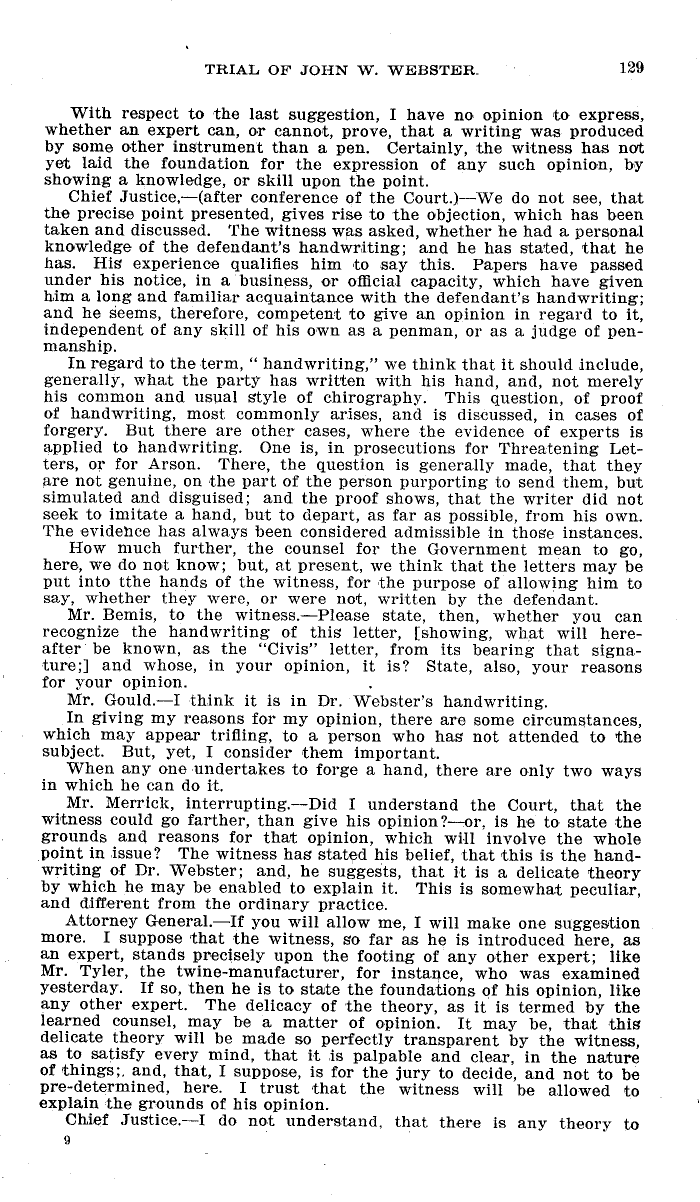|
TRIAL OF JOHN W. WEBSTER, 129
With respect to the last suggestion, I have no opinion to express,
whether an expert can, or cannot, prove, that a writing was produced
by some other instrument than a pen. Certainly, the witness has not
yet laid the foundation for the expression of any such opinion, by
showing a knowledge, or skill upon the point.
Chief Justice,-(after conference of the Court.)-We do not see, that
the precise point presented, gives rise to the objection, which has been
taken and discussed. The witness was asked, whether he had a personal
knowledge of the defendant's handwriting; and he has stated, that he
has. His experience qualifies him to say this. Papers have passed
under his notice, in a business, or official capacity, which have given
him a long and familiar acquaintance with the defendant's handwriting;
and he seems, therefore, competent to give an opinion in regard to it,
independent of any skill of his own as a penman, or as a judge of pen-
manship.
In regard to the term, " handwriting," we think that it should include,
generally, what the party has written with his hand, and, not merely
his common and usual style of chirography. This question, of proof
of handwriting, most. commonly arises, and is discussed, in cases of
forgery. But there are other cases, where the evidence of experts is
applied to handwriting. One is, in prosecutions for Threatening Let-
ters, or for Arson. There, the question is generally made, that they
are not genuine, on the part of the person purporting to send them, but
simulated and disguised; and the proof shows, that the writer did not
seek to imitate a hand, but to depart, as far as possible, from his own.
The evidence has always been considered admissible in those instances.
How much further, the counsel for the Government mean to go,
here, we do not know; but, at present, we think that the letters may be
put into tthe hands of the witness, for the purpose of allowing him to
say, whether they were, or were not, written by the defendant.
Mr. Bemis, to the witness.-Please state, then, whether you can
recognize the handwriting of this letter, [showing, what will here-
after be known, as the "Civis" letter, from its bearing that signa-
ture;] and whose, in your opinion, it is? State, also, your reasons
for your opinion.
Mr. Gould.-I think it is in Dr. Webster's handwriting.
In giving my reasons for my opinion, there are some circumstances,
which may appear trifling, to a person who has not attended to the
subject. But, yet, I consider them important.
When any one undertakes to forge a hand, there are only two ways
in which he can do it.
Mr. Merrick, interrupting.-Did I understand the Court, that the
witness could go farther, than give his opinion?-or, is he to state the
grounds and reasons for that opinion, which will involve the whole
point in issue? The witness has stated his belief, that this is the hand-
writing of Dr. Webster; and, he suggests, that it is a delicate theory
by which he may be enabled to explain it. This is somewhat peculiar,
and different from the ordinary practice.
Attorney General.-If you will allow me, I will make one suggestion
more. I suppose that the witness, so far as he is introduced here, as
an expert, stands precisely upon the footing of any other expert; like
Mr. Tyler, the twine-manufacturer, for instance, who was examined
yesterday. If so, then he is to state the foundations of his opinion, like
any other expert. The delicacy of the theory, as it is termed by the
learned counsel, may be a matter of opinion. It may be, that this
delicate theory will be made so perfectly transparent by the witness,
as to satisfy every mind, that it is palpable and clear, in the nature
of things;, and, that, I suppose, is for the jury to decide, and not to be
pre-determined, here. I trust that the witness will be allowed to
explain the grounds of his opinion.
Chief Justice.-I do not understand, that there is any theory to
9
|

